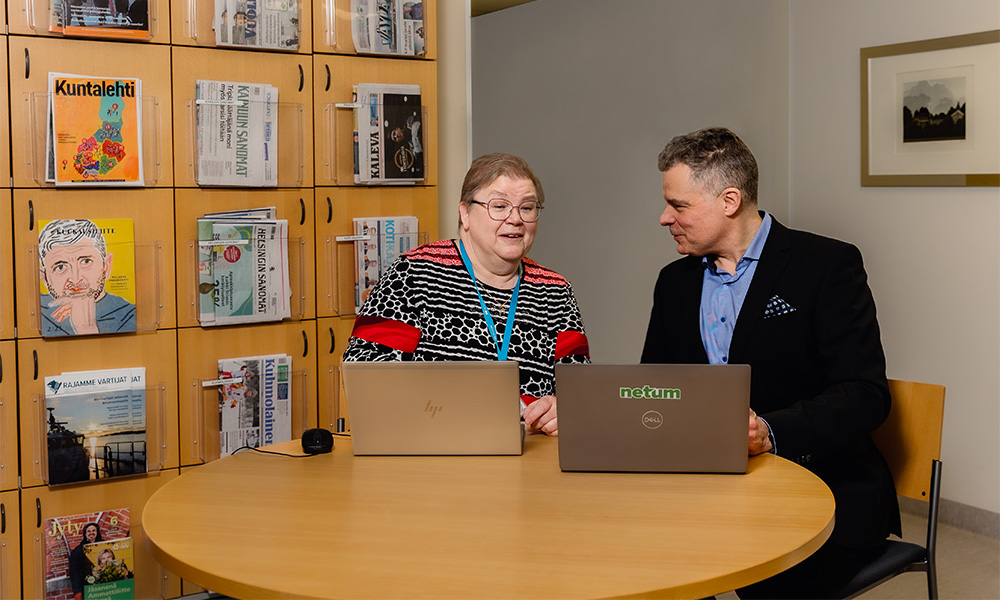
The knowledge management solution of the wellbeing services county of Kainuu guides to better decision-making
The new wellbeing services county is preparing to respond to future reporting requirements and to place knowledge management at the heart of decision-making.
The wellbeing services county of Kainuu, like all the other wellbeing services counties, saw the light of day on 1 January 2023. Six months earlier, a large-scale project had been launched with Netum as part of the ICT change support project of the wellbeing services county of Kainuu: the wellbeing services county to be established would need a new knowledge management system that would be able to meet the statutory reporting obligations. The aim was also to increase the capabilities in knowledge management so that all decision-making would be based on data in the future.
Kristiina Taskinen, Senior Planning Officer, Social Welfare and Healthcare, and Project Manager for the knowledge management system deployment project of the wellbeing services county of Kainuu, considers knowledge management to be absolutely central to the wellbeing services county’s operations.
– Knowledge management should be a self-evident element at all levels of the organisation. Decisions shouldn’t be made based on a gut feeling but on data. We want to increase the competence level of the entire organisation in knowledge management, Taskinen says.

Kristiina Taskinen, Senior Planning Officer, Social Welfare and Healthcare
Cost-effectiveness from data warehouse automation
The knowledge management system deployment project was kicked off after Netum won Kuntien Tiera’s tender for the knowledge management solution of the new wellbeing services county of Kainuu. There was no existing information system, and the data warehouse had to be built from scratch. Netum led the process of building a Data Vault 2.0 solution that uses data warehouse automation and is based on conceptual modelling.
Netum’s Key Account Manager, Patrik Uhinki, considers the most significant advantage of data warehouse automation to be its cost-effectiveness.
– Since the automation tool does most of the work, the data warehouse can be built quickly. Manual programming is kept to a minimum, which helps to avoid the risk of human errors, Uhinki says.
The first step was determining the source systems from which data would be collected to the data warehouse. The project is currently in the implementation phase, and customer testing will be initiated in the near future. Reports have already been created by using the Power BI tool.

Netum’s Key Account Manager Patrik Uhinki
The right information in the right place
The reports must, first and foremost, meet the requirements for the minimum information content set out in the law regulating wellbeing services counties. In Kainuu, however, knowledge management is seen from a broader perspective.
– We have 4,000 employees who record information in several different systems. This means that knowledge management starts at the grassroots. When we ensure that the data is appropriate and timely, it serves the wellbeing services county in the best possible way, Taskinen says.
The data collected by the wellbeing services county is extremely sensitive. Personal identification numbers, patient records and other critical information must be protected. Netum’s solid information security expertise has also added value to Kainuu’s knowledge management solution.
– Our information security unit has been closely involved in the project by providing consultation, Uhinki says.

Kristiina Taskinen and Patrik Uhinki
Better services and open-access information for Kainuu residents
Although the knowledge management system deployment project that is currently underway will be completed by the summer of 2023, the wellbeing services county of Kainuu is already looking further ahead into the future. The development of knowledge management will continue, operations must be consolidated, and the preconditions for knowledge management must be created. Taskinen believes that in the future, prediction, in particular, will play a more significant role in the utilisation of data.
– In the future, we can take advantage of the implemented knowledge management solution more diversely by harnessing artificial intelligence to predict different scenarios, which will undoubtedly also benefit decision-making in the wellbeing services counties.
Taskinen hopes that the development of knowledge management will eventually be reflected in the everyday lives of Kainuu residents as better services and the sharing of information.
– Collecting, analysing and utilising data enables us to better understand the needs of residents. Now that we have the tools to produce information easier and faster, it would also be great to share more detailed information on the activities of the wellbeing services county openly on our website, Taskinen says.